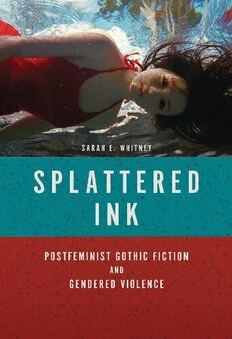
Splattered Ink: Postfeminist Gothic Fiction and Gendered Violence PDF
Preview Splattered Ink: Postfeminist Gothic Fiction and Gendered Violence
SARAH E. WHITNEY SPLATTERED INK POSTFEMINIST GOTHIC FICTION AND GENDERED VIOLENCE Splattered Ink Splattered Ink Postfeminist Gothic Fiction and Gendered Violence Sarah E. WhitnEy UnIVerSIty oF IllInoIS PreSS Urbana, Chicago, and Springfield © 2016 by the Board of Trustees of the University of Illinois All rights reserved 1 2 3 4 5 c p 5 4 3 2 1 ∞ This book is printed on acid-free paper. Library of Congress Cataloging-in-Publication Data Names: Whitney, Sarah E., 1976– author. Title: Splattered ink : postfeminist gothic fiction and gendered violence / Sarah E Whitney. Description: Urbana : University of Illinois Press, 2016. | Includes bibliographical references and index. | Description based on print version record and CIP data provided by publisher; resource not viewed. Identifiers: lccn 2016018900 (print) | lccn 2016005497 (ebook) | isbn 9780252098895 (E-Book) | isbn 9780252040467 (hardback : acid-free paper) | isbn 9780252081927 (paper : acid-free paper) Subjects: LCSH: American fiction—Women authors—History and criticism. | Gothic fiction (Literary genre), American— History and criticism. | BISAC: LITERARY CRITICISM / Gothic & Romance. | LITERARY CRITICISM / Feminist. | SOCIAL SCIENCE / Feminism & Feminist Theory. Classification: lcc ps374.w6 (print) | lcc ps374.w6 w47 2016 (ebook) | ddc 813.009/9287—dc23 lc record available at https://lccn.loc.gov/2016018900 To my family— James and Mary Whitney Craig Warren Jack and Reid Warren In the order in which we first met Contents Acknowledgments ix 1 Terror and Brightness: What Can Postfeminist Gothic Do? 1 2 Uneasy Lie the Bones: Alice Sebold’s Postfeminist Gothic 23 3 A Woman Might as Well Be Brave: Susanna Moore’s Ambient Fright 59 4 Break Through to Me: Sapphire’s Ghost in the Postfeminist Machine 85 5 Waking the Dead: Patricia Cornwell’s Forensic Imagination 115 6 Hedging Her Bets: Jodi Picoult’s Textured Ambivalence 138 7 Up from the Basement: Postfeminist Gothic’s Captive Imagination 165 Notes 201 Works Cited 211 Index 245 Acknowledgments My interests in gothic literature and in women’s literature have been shaped by many wonderful teachers from grade school to graduate school. Thank you to them all, most especially to Ann Connolly, Susan Dale, Susan Fraiman, Terri Goldrich, Nancy Gray, Elizabeth M. Hull, Deborah Morse, and Kim Wheat- ley. Thanks also to my Virginia mentors, Sharon Davie and Ginger Moran. I sincerely appreciate the support, encouragement, and cups of coffee provided by my colleagues in the English Program and the wider School of Humanities and Social Sciences at Penn State Erie, the Behrend College. Nearly all sections of the manuscript were presented and workshopped over several years at both the College English Association and National Women’s Studies Association; I always received constructive suggestions from panelists and audience members. The manuscript reviewers delivered perceptive comments in a helpful manner, for which I am much obliged. I want to thank Astrid Henry in particular for her kind, insightful suggestions about strengthening the manuscript. I’m indebted to Kristina Peszel for her outstanding technical work pre- paring the manuscript. Many additional thanks go to Jennifer Clark, Anne Rogers, and Roberta Engleman for their vital expertise. Working with the University of Illinois Press has been a very rewarding experience. Larin McLaughlin provided great support initially, and Dawn Durante has been a perceptive editor with invaluable suggestions and guidance. A revised version of chapter 2 was previously published in Tulsa Studies in Women’s Literature 29.2 (Fall 2010). I am grateful to the University of Tulsa for permission to reprint the work.
